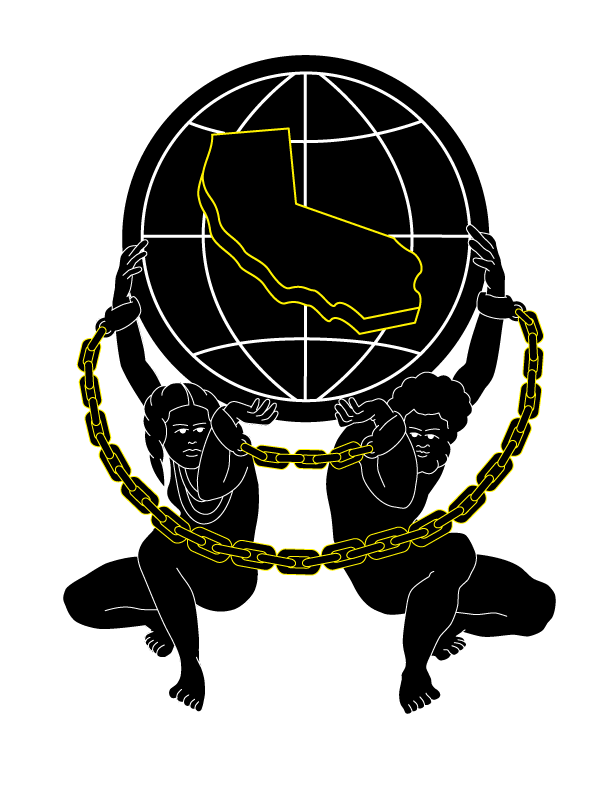
California Fugitive Slave Act
Statute: California Book of Statutes, 1852, Chapter 33: “Respecting Fugitives from Labor, and Slaves brought to this State prior to her admission into the Union,” page 67
Quote: “When a person held to labor in any State or Territory of the United States under the laws thereof, shall escape into this state, the person to whom such labor or service may be due, his agent or attorney, is hereby empowered to seize or arrest such fugitive from labor, or shall have the right to obtain a warrant of arrest for such fugitive...”
Act for the Government and Protection of Indians
Statute: California Book of Statues, 1850, Chapter 133: “Act for the Government and Protection of Indians,” page 408
Quote: “Any person having or hereafter obtaining a minor Indian, male or female, from the parents or relations of such Indian minor, and wishing to keep it, such person shall go before a Justice of the Peace in his Township...”
Testimony Exclusion Laws
Statute: California Book of Statutes, 1850, Chapter 99: “An Act Concerning Crimes and Punishment,” page 229, section 14
Quote: “No black or mulatto person, or Indian, shall be permitted to give evidence in favor of, or against, any white person.”
Amendments to the Act for the Government and Protection of Indians 1860 (Apprenticeship Laws)
Amendment in 1860: An Act Amendatory of an act Entitled “An Act for the Government and Protection of Indians passed April 22nd” 1850: (page 1210)
Quote: “Any person desirous of obtaining any vagrant Indian or Indians as have no settled habitation or means of livelihood, and have not placed themselves under the protection of any white person, to bind and put out such Indians as apprentices”
Act: An Act to secure Homesteads to actual Settlers on the Public Domain.
Peter Burnett Governor Speech 1849 (Advocating for Banning Black People from CA):
Quote: “We have certainly the right to prevent any class of population from settling in our State, that we deem injurious to our society. Had they been born here, and had acquired rights in consequence, I should not recommend any measures to expel them. They are not now here, – except a few in comparison with the numbers that would be here, – and the object is to keep them out.”
A Bill for An Act Prohibiting the Immigration of Free Negroes and Persons of Colour To this State (eventually failed). Referenced here, page 1223
Peter Burnett Speech 1851 (Arguing for Extermination of Native People)
Quote: "That a war of extermination will continue to be waged between the races until the Indian race becomes extinct must be expected. While we cannot anticipate this result but with painful regret, the inevitable destiny of the race is beyond the power or wisdom of man to avert."
In the Matter of Archy, on Habeas Corpus (CA Supreme Court Ruling Re-enslaving Archy Lee)
Quote from Burnett (citing Dred Scott): “It must be concluded that, where slavery exists, the right of property of the master in the slave must follow as a necessary incident. This right of property is recognized by the Constitution of the United States.”
Archy Lee Court Documents | More
In Re: Perkins Decision (First Test of California Fugitive Slave Act of 1852)
Quote: “The State of California has certainly not entered into any contract with free negroes, fugitives, or slaves, by providing in the Constitution that neither slavery nor involuntary servitude shall exist in this State, which would prevent her, upon proper occasion, from removing all or any one of these classes from her borders.”
Quote: “It must appear clear, therefore, that the power to establish separate public schools for children of African descent, and to exclude them from the public schools established for white children, has been taken away from boards of school trustees and boards of education, and that the power claimed by the teacher and the board of education of the city of Visalia does not exist.”
Mason v. Smith (1856 Court Ruling That Freed Biddy Mason and Family)
Quote: “And it further appearing by satisfactory proof to the judge here, that all of the said persons of color are entitled to their freedom, and are free and cannot be held in slavery or involuntary servitude, it is therefore argued that they are entitled to their freedom and are free forever.”
Peter Burnett
George Gordon
Testimony Exclusion Laws
Biddy Mason
Perkins
Alvin Coffey
Native American Slave Market
Rosa
Bloody Island Massacre
Archy Lee
Mifflin Wistar Gibbs
Colored Conventions
Black Press and Philip Alexander Bell
Mary Ellen Pleasant
Broderick-Terry Duel
Daniel Blue and Edith
Edmond Wysinger
Toypurina
California Missions and Baptism
Agency at the Missions
Indian Boarding Schools
Homestead Act
Act for the Government and Protection of Indians
California Fugitive Slave Act

The mission of Gold Chains is to uncover the hidden history of slavery in California by lifting up the voices of courageous African American and Native American individuals who challenged their brutal treatment and demanded their civil rights, inspiring us with their ingenuity, resilience, and tenacity. We aim to expose the role of the courts, laws, and the tacit acceptance of white supremacy in sanctioning race-based violence and discrimination that continues into the present day. Through an unflinching examination of our collective past, we invite California to become truly aware and authentically enlightened.